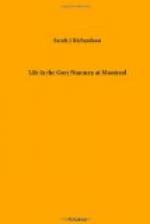Such is the language of one who knew so well what popery was, that he fled from it as from a hell upon earth.
In his further remarks upon the horrors of convent life in the United States, he fully confirms the statements in the foregoing narrative. He says, “It is time that American gentlemen, who are so much occupied in business, should think of the dangers of the confessional, and the miseries endured by innocent, duped, American, imprisoned females in this free country; and remember that these American ladies who have been duped and enticed by Jesuitical intrigue and craft, into their female convents, have no means of deliverance; they cannot write a letter to a friend without the consent and inspection of the Mother Abbess, who is always and invariably a female tyrant, a creature in the pay of the Bishop, and dependent upon the Bishop for her despotic office of power. The poor, unfortunate, imprisoned American female has no means of redress in her power. She cannot communicate her story of wrong and suffering to any living being beyond the walls of her prison. She may have a father, a mother, a dear brother, or a sister, who, if they knew one-sixteenth part of her wrongs and sufferings, would fly at once to see her and sympathize with her in her anguish. But the Jesuit confessor attached to the prison is ever on the alert. Those ladies who appear the most unhappy, and unreconciled to their prison, are compelled to attend the confessional every day; and thus the artful Jesuit, by a thousand cross questions, is made to understand perfectly the state of their minds. The Lady Porter, or door-keeper and jailor, is always a creature of the priest’s, and a great favorite with the Mother Abbess. Should any friends call to see an unhappy nun who is utterly unreconciled to her fate, the Lady Porter is instructed to inform those relatives that the dear nun they want to see so much, is so perfectly happy, and given up to heavenly meditations, that she cannot be persuaded to see an earthly relative. At the same time the Mother Abbess dismisses the relatives with a very sorrowful countenance, and regrets very much, in appearance, their disappointment. But the unhappy nun is never informed that her friends or relatives have called to inquire after her welfare. How amazing, that government should allow such prisons in the name of religion!”
CONVENT OF THE. CAPUCHINS IN SANTIAGO
In a late number of “The American and Foreign Christian Union,” we find the following account of conventual life from a report of a Missionary in Chile, South America.




